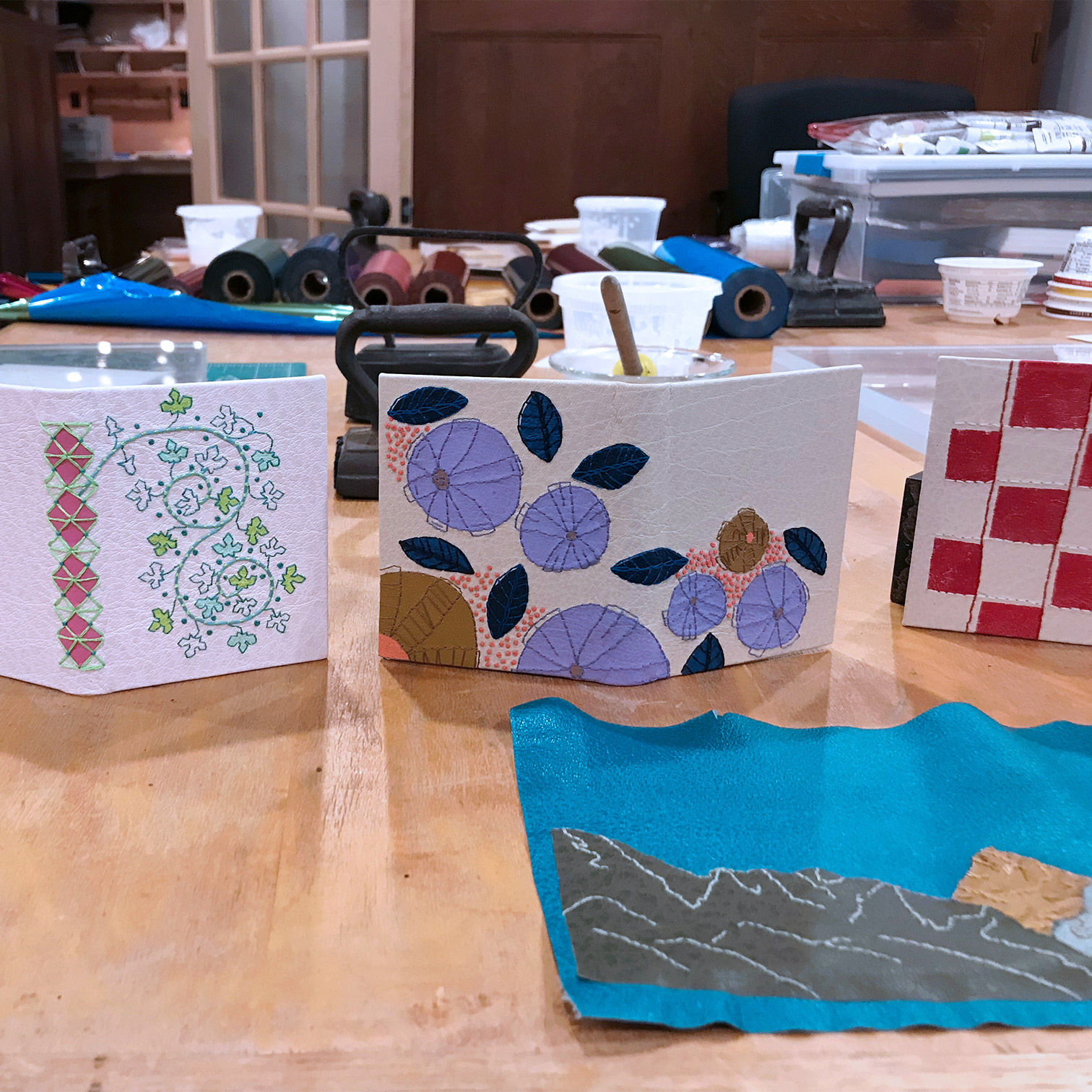Erin Fletcher : Fine Binding & Edition Binding





6 sessions:
Jan 26, Feb 2, 9 or 11, 16, 23, Mar 2
(Tuesday evenings)
Session 1 // Live Instruction – Jan 26
Session 2 // Live Instruction – Feb 2
Session 3 // Individual Meetings (15m) – Feb 9 or 11
Session 4 // Live Instruction – Feb 16
Session 5 // Live Instruction – Feb 23
Session 6 // Show & Tell – March 2
All sessions (except Session 3) will run from:
6:00 – 8:00pm (eastern time)
5:00 – 7:00pm (central time)
4:00 – 6:00pm (mountain time)
3:00 – 5:00pm (pacific time)
Jan 26, Feb 2, 9 or 11, 16, 23, Mar 2
(Tuesday evenings)
Session 1 // Live Instruction – Jan 26
Session 2 // Live Instruction – Feb 2
Session 3 // Individual Meetings (15m) – Feb 9 or 11
Session 4 // Live Instruction – Feb 16
Session 5 // Live Instruction – Feb 23
Session 6 // Show & Tell – March 2
All sessions (except Session 3) will run from:
6:00 – 8:00pm (eastern time)
5:00 – 7:00pm (central time)
4:00 – 6:00pm (mountain time)
3:00 – 5:00pm (pacific time)
Workshop // Embroidered Leather Binding
Description
Historical examples of embroidered bindings typically date back from the close of the 14th to the mid-17th century and were primarily done on silk, satin, velvet or canvas. These highly decorative bindings grew out of the tradition of textile bindings that became popular in England during the 14th and 15th centuries. The embroiderers working on these bindings included both professional (predominately male artisans) and amateur needle-workers (typically women in their homes).
Within the past few decades contemporary bookbinders and book artists have been incorporating embroidery and other sewing techniques into their work. For many of these artists, it was an easy transition to bring the two mediums together. The range of materials and methods has certainly expanded beyond the historical examples. Using thread over traditional binding techniques allows the artist to express their vision in an unique way and introduces a different tactile experience to the binding. Embroidered threads can be used to draw in the abstract or add highlights and shadows to an illustrative design. The threads can be kept neat or left to tangle.
In this workshop, students will work from start to finish on their own embroidered leather binding over the course of several sessions. Students will be asked to prep their own text block and leather for a full leather case binding, however a kit of materials is available for purchase. Students will be introduced to a few hand-embroidery stitches and the best techniques for sewing into leather, cloth, and paper. We will also discuss ways to transfer the design onto the material, how to incorporate onlays and how to prepare the finished embroidered piece for covering.
This workshop will include live instruction through Zoom, which will be recorded and available to participants for a limited period of time. This workshop will not cover the foundations of working with leather, therefore students must have some prior knowledge of leather work. However, the embroidery techniques taught in this workshop can be applied to other materials such as cloth or paper. Please contact me if you have questions determining if this workshop is right for you.
Skill Level: Expert
Material Kit
The workshop fee includes a material kit, which will be shipped to you prior to the workshop. In order to receive the material kit on time, please register by January 15th. Below is a list of tools and materials that you must supply yourself.
If you are unable to prep all of the materials listed below, some additional items can be added to your Material Kit for an extra $60.00. Those items are:
- Leather – Pared and Ready to Work With
- Prepped Text Block
- Cover Boards and Spine Piece
Tools and Materials
Students must supply the following tools and materials. Check out the vendor list for recommended suppliers.
Tool list
- Range of embroidery and milliners (straw) needles
- Embroider scissors or snips
- 6 – 8” embroidery hoop (wood or plastic)
- Pin Vise (size A or B)
- Teflon folder
- Pencil
- Cutting mat
- Olfa Knife (for cutting onlays – I prefer Olfa Art Knife AK-1/5B)
- Tweezers
- Various brushes for PVA and paste
- Paring knife and surface for paring (only if you plan to work with leather)
Structure for class
Full Leather Rounded-Back Case Binding
Size Recommendation for Text Block: 100 x 75mm
Materials
- Leather
- Board/Paper for Case
- Text Block (ready to case-in)
- Decorative Supplies (paint, onlay leather, finishing tools, etc.)
- Stranded embroidery floss (recommend: DMC 6-stranded cotton, Gloriana 12-stranded silk or something similar)
- Tracing paper
- PVA and paste
Offered for USA & International Students
You are welcome to sign up for this workshop regardless of your location. However, at this time kits will only be shipped to students within the US. If you are outside of the US, please email me directly in order to register and recieve information about prepping your own material kit.
Each Workshop is Recorded
All workshops will be recorded and made available to all registered students for a period of 60 days. A link to the recording will be sent out 1 day after it is recorded.Refund Policy
No refunds will be issued once material kits are shipped or 10 days prior to the start of the workshop. Workshops will run with a minimum of 4 students, if this number is not met then a refund will be issued.
